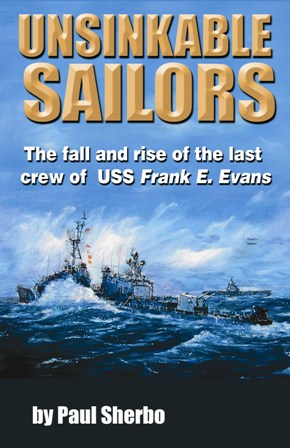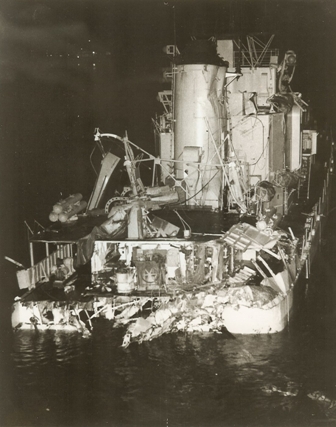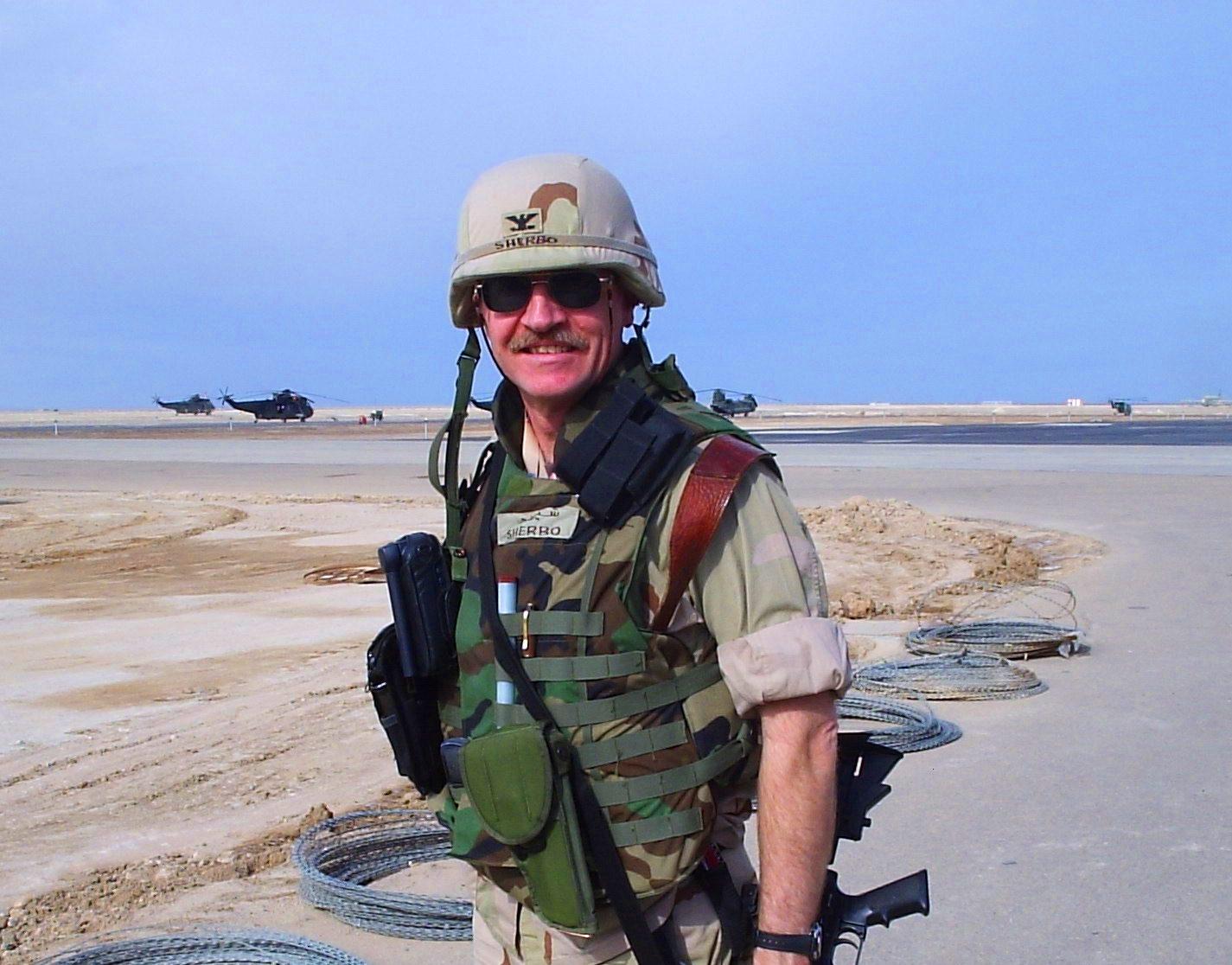|
| Click Here to order Unsinkable Sailors |

|
Be sure to read the reviews beneath the description! UNSINKABLE
SAILORS
The fall and rise of the
last crew
of USS Frank E. Evans
By
Paul Sherbo, Capt. USNR Ret.
Welcome family, friends, and former Crew members of the USS Frank E. Evans
| $16.95 Plus S&H |

|
| Save 20%! Order your copy today! |
June 2009 marked
the fortieth anniversary of the sinking of the United States Ship Frank E. Evans (DD-754), a Navy destroyer
that suffered catastrophic damage and horrendous loss of life on 3 June 1969 when an aircraft carrier, the Australian HMAS
Melbourne, collided with Evans during a naval training exercise at sea. Operating as part of a combined
force with the Royal Australian Navy and other allied naval ships, the Evans executed a starboard turn into the path
of Melbourne at 0315 on that fateful morning, and was cut in half by the heavier and larger war ship. Evans’
severed bow sank almost immediately taking 73 unfortunate crewmembers with it. Only one body was recovered in the aftermath
of the collision, bringing the total lost to 74. Out of the 273 crewmembers on board, 199 survived. The broken off stern section
remained afloat. Before the collision, Evans served in World War II, in the Korean
War and briefly in Viet Nam. Commissioned in 1945 near the end of WWII, she was assigned escort and radar picket duty
in the Pacific Theatre. After the war, Evans patrolled the Yellow Sea, assisted
with the embarkation of American POWs from Manchuria and helped to provide cover for the occupation landings in Korea.
In March of 1946, she arrived in San Francisco, California and on 14 December 1949, she was decommissioned and assigned into the reserve fleet. Re-commissioned on 15 September in 1950 for the
Korean War, Evans then joined the 7th Fleet and began the siege of Wonsan, engaging enemy shore batteries.
She also participated in rescuing downed pilots and coordinated bombing missions by United Nations aircraft all across
Korea. On her second Korean tour, she served on both patrol and bombardment duty. After the Korean War, from 1954 through 1960, Evans
completed five tours of duty to the Far East as well as joining training exercises along the west coast of the United States
and the Hawaiian Islands, often combined with the Canadian Navy.
During Viet Nam, she served on patrol and bombardment duty. Evans also participated
in the 1962 TV military comedy series Ensign O’Toole starring Dean Jones in the title role.
Military Writers Society of America Book Review - Unsinkable Sailors: The fall and rise of the last
crew of the U.S.S. Frank E. Evans by Paul Sherbo.
Collisions
and accidents at sea are always tragic events. Not all lead to the results as in the case of the USS Frank E. Evans in 1969.
Having experienced such an event, but with no deaths involved I easily identified with this story.
First impressions
would have folks shaking their heads “how can ships collide on a large ocean.” Naval ships operate at times in
rather close formations for large vessels. This is not turning a corner in your corvette, a lot of room is required and above
that, good solid communication and attention by all responsible for keeping their collective eyes on what is going on.
The story would be of great interest to sailors and history buffs. It would help greatly those who have not or do
not travel on the seas. It awakens you to the dangers that exist at every minute on board a ship. An error such as what happened
in this event takes numerous lives, the ocean is unforgiving.
The nature of the story may turn off the casual reader
who is used to Hollywood’s action packed thrillers, but do not put the book down. This book will result in your
learning something new and you will come away from it with a new pride in those that serve in the U.S. Navy.
This
is a story of tragedy and survival, as the efforts of many resulted in the saving of numerous lives that would have been lost
if not for the combined efforts of all.
Military Writers Society of America

|
| Frank E. Evans (DD-754), after the collission |
| Author, Paul Sherbo, serving in Iraq |

|
Captain Paul Sherbo, USNR (ret.)
of Lakewood, Colorado has written a book about the USS Frank E. Evans titled, Unsinkable Sailors: The fall and rise
of the last crew of USS Frank E. Evans that tells the story of personal tragedy, survival and perseverance. The book
describes in chilling detail the historical events that led up to the at-sea collision, the accounts of what was happening
during the collision and the events in the aftermath of such a tragedy quoted entirely from naval records, interviews with
surviving witnesses (both on the Evans and the Melbourne) and researching the Record of Proceedings transcripts investigating the accident.
'Capsized, buoyancy gone, crewmen trapped and confused, the forward half of
the ship sank toward the ocean floor. The dark, warm waters of the South China Sea closed over the broken hull, carrying it
and a final human scream downward toward oblivion.'
The publisher of Unsinkable Sailors: The fall and rise of the last crew of USS Frank E. Evans
is Patriot Media, Inc. of Niceville, Florida. Unsinkable Sailors can be purchased online at www.patriotmediainc.com
after its release date of June 3rd by calling (850) 897-4204.
Unsinkable Sailors
review: Using
official documents, this is the first comprehensive American review of the tragic 1969 collision at sea where an American
Destroyer was cut in half by an Australian Aircraft Carrier. Sailors in the doomed bow of USS Frank E. Evans
(DD-754) woke to a ship rolling out of control, tons of seawater plunging in. Few escaped. Those sleeping in the
after half of the ship rushed forward to their battle stations, some "running out of ship" in total darkness and
into the water. The testimonies of surviving crew from the formal inquiries put you there, before, during, and after
the collision. Amid their sudden, surprised confusion, the courage and heroism of both crews lend a genuine admiration
for their bravery and spirit.
EP Bradley Jr.
Quick Peek!
Click to Preview a Page
from Unsinkable Sailors
Table of Contents
Title Page
Prologue
First Call to Colors
Enter content here
Enter content here
Enter content here
|